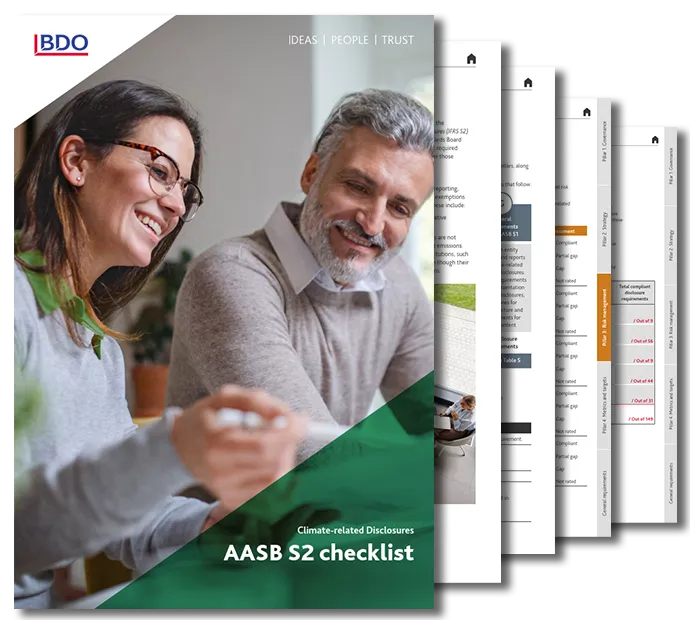Transition plans in focus: New IFRS guidance supports AASB S2 implementation
Transition plans in focus: New IFRS guidance supports AASB S2 implementation
As climate-related financial disclosures become mainstream, investors, regulators, and the public are increasingly scrutinising the credibility of an organisation’s transition plan. Transition plans are no longer just strategic aspirations; they’re fast becoming a litmus test for how seriously organisations are preparing for a low-carbon, climate-resilient future.
In this context, the recent release of the IFRS Foundation’s guidance on transition plan disclosures provides timely and practical support for Australian entities preparing to report under AASB S2 Climate-related Disclosures (AASB S2). While the guidance does not introduce new requirements, it helps entities deliver high-quality and useful information about their climate-related transition efforts, including mitigation and adaptation strategies.
Clarifying expectations under AASB S2
The guidance provides clarity on how organisations can meet existing disclosure expectations under AASB S2, particularly when it comes to transition plans. For each of the four core content elements, governance, strategy, risk management, and metrics and targets, the guidance:
- Identifies the relevant disclosure requirements in IFRS S2
- Illustrates how an entity might apply these requirements in practice.
It also includes sector-specific considerations drawn from the Transition Plan Taskforce (TPT) guidance, which are especially relevant for entities operating in:
- Asset management and ownership
- Banking
- Electric utilities and power generation
- Food and beverage
- Metals and mining
- Oil and gas.
These examples help bridge the gap between principles-based requirements and practical implementation, offering a useful reference point for preparers in those industries seeking to enhance the credibility and clarity of their disclosures.
Why transition plans matter even if they’re not mandatory
IFRS S2 does not require entities to have or publish a transition plan. However, if a plan exists, the standard requires disclosure of key information about it, such as strategic goals, assumptions, dependencies, and progress.
This reflects a broader shift: stakeholders increasingly expect transparency around how entities are preparing for a lower-carbon and climate-resilient economy. Transition plans are becoming central to mandatory sustainability reporting, not just sustainability strategy.
What you need to disclose
The IFRS guidance outlines several areas where entities must disclose information if a strategic climate-related goal or transition plan exists:
- Governance: Who is responsible for oversight and implementation? How are skills, incentives, and accountability aligned?
- Strategy: What is the entity’s approach to transition? What are the key assumptions and dependencies?
- Metrics and targets: What targets have been set? How is progress measured and reported?
- Financial impacts: What are the anticipated effects on financial position, performance, and cash flows?
- Scenario analysis: How resilient is the strategy under different climate scenarios?
Importantly, organisations without a formal transition plan must still disclose how they are responding to climate-related risks and opportunities.

